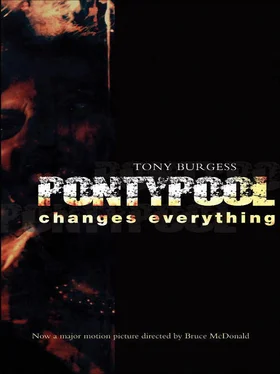Sitting in the little coatroom of a country church, surrounded by a dragon of wire coat hangers, Les Reardon has been shifting uncomfortably on a small wooden chair for two hours. Expecting to leave any second, he’s kept his coat on. Now that the detective has come in and sat down, Les regards the chain of hangers circling him as a lost opportunity. With his coat off he might have appeared cooperative, casual, at home in the investigation. Les puts his heavily padded elbows on his knees and twirls his cap in his hands. He feels restless. He wants to say something.
The detective continues writing in a folder. He’ll do this for five minutes. Testing his theory. Mr. Reardon is a quiet, patient man. Mr. Reardon works with someone else’s cows and horses. He’s a drama teacher. The detective likes men with decent effeminate professions. He looks up at Les to assess the femaleness of the man, to determine whether to contest it or flirt with him. The detective notices that his own handwriting is pioneering the interview, the dots are pecking impatiently on the outskirts of the “i”s, and a brusque circle around the date misses something crucial. The detective introduces himself.
“Mr. Reardon, I’m detective Peterson. How are you? I appreciate you co-operating.”
The detective attempts to untuck his sleeves at the elbow, but can’t.
“I guess what I need to hear from you is exactly what happened out there.”
Les tells his story. He remembers it as a western, a shootout, but he tells it as if he were a decent man, protecting his property. As he tells the story, “I found a wounded deer in the garage last year, so I have posted the property…” in Les’s head, or rather his imagination, a crazy bulb swings at the end of a cord, and the drama teacher stands in its green light, staring down the sights of a weapon. His grin hangs off the side of his face, a stirrup lost across the ankle of a boot. When he’s finished, the detective gauges the effect of the murder scene on Les. A drama coach, or whatever he is, he’s not so decent. He’s acting.
Let’s see a show.
“Awright, I have a dead man, and I have a man here, sitting across from me, who I found at the scene. You chased the victim into the dense brush, swinging his rifle at your side, and all of a sudden it’s a homicide scene. Now, what do I say? What do I do with your connection here?”
Les straightens the label on the inside of his cap. It curls back against his baby finger, a tighter furl for having been unwound.
“Uh. Detective, I didn’t shoot him. He wasn’t shot. He was… uh… he was…”
“Yeah, yeah, we don’t know what he was yet. Was there anybody else with you?”
“With me? No. Not with me. I didn’t see anybody else.”
“You live alone Mr. Reardon?”
“Yep.”
“Ever married?”
“Well, not quite.”
“What’s that mean?”
“I lived with a woman for four years.”
“Here in Pontypool?”
“No. In Toronto. In Parkdale.”
“Any children?”
“Yeah, uh… one.”
“How old?”
“One month.”
“Really. Daughter?”
“Son.”
“Awright, Mr. Reardon, we’re going to be in touch with you. So, make sure you stay available. If you should happen to remember anything, anything at all, call me at this number.”
The detective gives Les his card and leaves the coatroom door open as he goes. He turns down a hallway that he’s sure Les will not take when he leaves. Peterson leans his thighs against a radiator that runs the length of a wall underneath a basement window. He looks up at the parking lot that spreads out from his chin. A lone vehicle sits in the southwest corner. The truck is Les Reardon, remote, beige, built for leaving in. Closer to the detective is a pyramid of ice, jaundiced and sore with crystal pellets. This is the son. The detective looks for the baby’s mother. The small parking lot is bordered by a winter-toughened hedge. In its chipped line are rocks of ice. No mother. Beyond, the highway. Car-free. Further, the heavy trees and, not visible from this little window, a frozen river that has a crazy, pink spot in its eye. No mother. A month old. Jesus, what happened there?
Les stands four feet from his car with his arms stretched out and his knees bent. A warm wind arrives, just as he steps onto a large patch of ice. Now he hangs like a surfer against a blue screen — dipping and rising — not walking. Eventually he falls. In the middle of his wheel to the earth he doesn’t think of his son, he thinks of the infant’s mother. He remembers — when Helen’s blood sugar levels slipped off and she would seem to lose sight of everything and her hands made small, brittle help-me flights up to her face — how impossibly cold her lips became. He’d kiss them just to feel their cold, their distinct mark on his own melting mouth. He loved her then.
The ice slams against his temple. He holds his head in his hands as he lies there, pulling his knees up. Les is crying, and if he’s crying for anyone it’s himself, even though a tiny bug, in the centre of his brain, shaped like a baby, is crying as well. The baby’s crying. Les moves to the edge of the ice, and he presses the tips of his fingers over the frozen bubbles drawing himself forward. He manages to get to his feet and recovers quickly. He crawls the truck to the edge of the highway and pauses to join the traffic on the empty road.
Detective Peterson has his hand over his mouth, as much to stifle noise as to keep a piece of sandwich from flying loose. He’s just seen Les fall, and he’s laughing with his back to the wall. As his laughter hardens, he slides down onto the radiator. It will spread heat up through the seat of his pants, and he will have to jump forward, yelping. He will lose a little nugget of bread and fish while he spins around, palming the cheeks of his ass.
As funny as this is, and it’s probably funnier than it seems, it’s more. It’s what you get for laughing cruelly at the pain of others.
Les is going to meet with Mary at the school. He wants to talk about the Ed Gein thing. As he drives he pictures his own revulsion at the children’s proposal. Mary’s considered it, accepted it. Les pictures higher and higher moments of fine discomfort. His Orpheus. Les looks out the window at the snow fields passing in long checkers of white and black. Out there. Out there is a killer for God’s sake. For a moment he includes his afternoon encounter with bloody death as just the very reason why Ed Gein is an inappropriate subject.
He looks forward to the centre line shooting its bars at the grill. Slow? Fast? What kind of a phrase is it?
Les adds up his argument for Ovid and against Ed Gein. Shape Shifter versus Killer. The former can also be the latter, but the latter can only destroy the former. Open. Closed. Dead. Alive. Good. Very bad. Except, he can’t quite hear the speech, something is holding it in front of the truck, not letting it in where it could be audible. Les looks out and watches a barn, black as the moon, and he knows why he has no speech. Because there really is a killer out there. I crossed paths with a predator today. Someone bloody. Out of control. In control? He’s out there. Now. He feels the tickle of fear grow. He pictures the rough hands of Ed Gein pounding the side of a horse.
“Hi Les.”
Mary is the principal of the school. Her background is military, and when the province attempted to redistribute talent outside the cities it met with a firmer resolve than its own in Mary. She is well liked, far friendlier, with more imagination and sanity than the young, unstable reformers so popularized by the government. At least that’s the local perception. She is a veteran of the tough decision, respectful of things beyond her control, with an angry, emotional bottom line. She detests the current government’s flippant emergencies. She is alarmed at the appearance of Les.
Читать дальше












